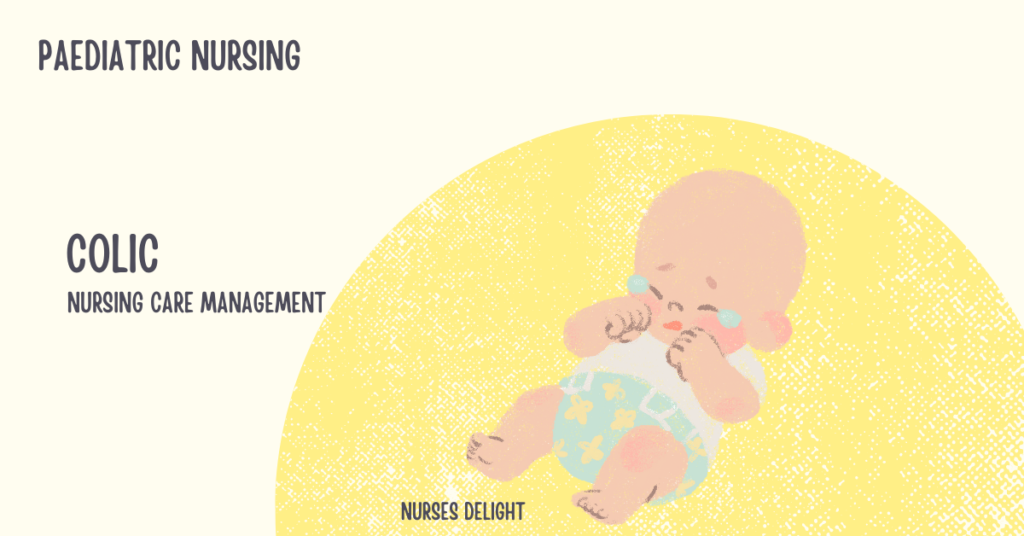Colic is characterized by persistent inconsolable crying in healthy neonate or infant lasting 3 hours or more for more than three days a week. These episodes typically occur in the late afternoon or evening. It affects around 10% to 20% of babies.
Causes of Colic
Causes of colic are idiopathic. However, there are possible suggestions which include;
- A partially developed digestive system
- Food allergies or intolerances
- Imbalance in normal flora in the digestive tract.
- Overeating, underfeeding, or infrequent burping
- Early kind of infantile migraine.
- Family Stress or Anxiety
- The process of CNS maturation that can impair an infant’s ability to self-regulate (particularly in terms of overstimulation and inability to self-calm).
Clinical Manifestations of Colic
In an otherwise healthy infant, they may have colic if they;
- Have inconsolable cries
- Refuses the breast or bottle
- Have a dry diaper all the time
- Has no fever or other medical reason for crying.
Assessment and Diagnostic Findings
When diagnosing colic in infants, healthcare providers typically rely on clinical assessments rather than specific diagnostic tests. However, in some cases, tests may be performed to rule out other potential causes of the infant’s symptoms. These tests may include:
1.Physical Examination: A thorough physical examination of the infant may be conducted to assess for any signs of discomfort, illness, or underlying medical conditions.
2. Medical History: Gathering a comprehensive medical history from the parents or caregivers can provide valuable information about the infant’s symptoms, feeding patterns, and overall health.
3. Laboratory Tests: In some cases, healthcare providers may order blood tests or other laboratory investigations to rule out conditions such as infections or metabolic disorders.
4. Imaging Studies: Imaging studies such as ultrasound, X-ray, or abdominal imaging may be ordered if there are concerns about structural abnormalities or gastrointestinal issues.
5. Allergy Testing: If there is suspicion of food allergies contributing to the infant’s symptoms, allergy testing such skin prick test, blood antibody tests and food challenge tests may be recommended.
6. Stool Studies: Analyzing the infant’s stool for signs of infection, inflammation, or malabsorption may be considered in certain cases.
7. Gastric Emptying Studies: In rare instances, gastric emptying studies may be performed to assess how quickly food moves through the infant’s digestive tract.
Medical Management
There is no medical cure for colic, only time. By 3 months of age, most newborns have either outgrown or significantly improved their problems.
The medical management of colic in infants focuses on providing comfort and support to both the infant and their caregivers. While colic typically resolves on its own with time, there are several strategies that healthcare providers may recommend to help alleviate symptoms:
1. Parental Education and Support: Providing parents with information about colic, its expected course, and coping strategies can be invaluable. Encouraging parents to seek support from family members, friends, or support groups can also help them navigate this challenging period.
2. Feeding Techniques: Healthcare providers may offer guidance on feeding techniques, such as ensuring proper burping during and after feedings, feeding in an upright position, and avoiding overfeeding.
3. Formula Changes: For formula-fed infants, switching to a different type of formula (e.g., hypoallergenic formula) may be recommended if there is suspicion of food intolerance or allergy.
4. Dietary Modifications for Breastfeeding Mothers: If the infant is breastfed and there is concern about food allergies, healthcare providers may suggest that the mother modify her diet by eliminating certain foods (e.g., dairy, caffeine, spicy foods) to see if it helps alleviate symptoms.
5. Probiotics: Some studies suggest that probiotics may help reduce symptoms of colic in some infants. Healthcare providers may recommend a specific probiotic strain or formulation for infants with colic.
6. Swaddling and Soothing Techniques: Techniques such as swaddling, gentle rocking, using white noise or soothing sounds, and providing a pacifier may help calm a colicky infant.
7. Medications: In some cases, healthcare providers may prescribe medications to help manage symptoms associated with colic, such as gas drops (simethicone) or anti-reflux medications. However, the use of medication for colic is typically reserved for cases where other measures have been ineffective and under the guidance of a healthcare provider.
Nursing Management
Assessment
- Conduct a thorough assessment of the infant’s symptoms, including the duration, frequency, and intensity of crying episodes.
- Obtain a detailed history from the parents or caregivers, including feeding patterns, sleeping habits, and any factors that seem to exacerbate or alleviate the infant’s symptoms.
- Assess the infant’s general health, including growth and development, to rule out any underlying medical conditions.
- Evaluate the parents’ coping abilities and support systems, as colic can be stressful for caregivers.
Diagnosis
- Parental stress and anxiety related to managing a colicky infant.
- Ineffective coping related to lack of knowledge about colic management techniques.
Planning
- Collaborate with the parents or caregivers to establish realistic goals and outcomes for managing colic.
- Develop a plan of care that includes strategies for comforting the infant during crying episodes, promoting parental coping and support, and educating the family about colic management.
- Set goals for reducing the frequency and intensity of colic symptoms and improving the overall well-being of the infant and family.
Implementation
- Provide education and support to parents on soothing techniques for colicky infants, such as swaddling, rocking, and using white noise.
- Teach parents about proper feeding techniques and positioning to minimize gastrointestinal discomfort.
- Encourage parents to take breaks and seek support from family members, friends, or support groups when needed.
- Collaborate with other healthcare professionals, such as lactation consultants or pediatricians, as needed to address feeding issues or concerns about food allergies.
- Offer reassurance and emotional support to parents as they navigate the challenges of caring for a colicky infant.
Evaluation
- Regularly reassess the infant’s symptoms and response to nursing interventions.
- Evaluate parental coping and stress levels and adjust the plan of care as needed.
- Monitor the infant’s growth and development to ensure that colic is not affecting overall health and well-being.
- Celebrate achievements and progress toward established goals with the parents or caregivers.
- Provide ongoing support and encouragement to the family as they continue to manage colic.



